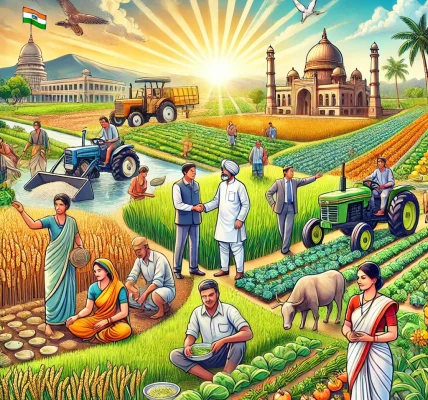Introduction
The global agricultural market presents significant opportunities for Indian farmers to expand their reach beyond domestic boundaries. However, entering the international marketplace requires adherence to quality standards, logistical support, and financial backing. To support this, the Indian government has launched various schemes and initiatives aimed at boosting agricultural exports. This article explores the key government schemes that help farmers become export-ready and compete in global markets.
1. Agriculture Export Policy (AEP) 2018
The Agriculture Export Policy (AEP) was introduced in 2018 to boost agricultural exports and double farmers’ income. The policy aims to:
- Diversify export baskets with a focus on value-added products.
- Improve infrastructure and logistics for seamless export processes.
- Promote organic and GI-tagged agricultural products for global recognition.
- Remove trade barriers and provide market intelligence support.
Eligibility:
- Individual farmers, farmer-producer organizations (FPOs), exporters, and agribusiness firms.
Benefits:
- Financial support for export-related infrastructure.
- Training on international standards and certification processes.
- Support for branding and promotional activities.
2. Market Access Initiative (MAI) Scheme
The Market Access Initiative (MAI) Scheme is designed to promote Indian agricultural products in global markets by providing financial assistance for:
- Participation in international trade fairs and buyer-seller meets.
- Market research and publicity campaigns.
- Registration of Geographical Indications (GI) for Indian agri-products.
- Compliance with sanitary and phytosanitary (SPS) measures.
Eligibility:
- Agricultural exporters, FPOs, state government agencies, and trade bodies.
Benefits:
- Financial aid to attend global trade expos.
- Assistance for acquiring quality certifications like Global GAP and HACCP.
- Funds for conducting feasibility studies and research.
3. APEDA – Agricultural and Processed Food Products Export Development Authority
The APEDA plays a crucial role in facilitating agricultural exports from India. It provides:
- Export registration and certification for agri-products.
- Infrastructure development support, such as packhouses, cold storage, and testing labs.
- Financial assistance for branding and marketing in foreign markets.
Eligibility:
- Farmers, exporters, agribusiness firms, and FPOs involved in the export of registered agri-products.
Benefits:
- Funding support for infrastructure improvement.
- Promotion of organic farming and certification support.
- Access to market intelligence reports and export analytics.
4. National Horticulture Board (NHB) Export Promotion Scheme
The NHB Export Promotion Scheme supports horticulture farmers in exporting fruits, vegetables, and flowers. The scheme includes:
- Financial assistance for setting up processing units.
- Post-harvest management to enhance product shelf life.
- Support for international quality certification.
Eligibility:
- Horticulture farmers, FPOs, exporters, and agribusiness units.
Benefits:
- Up to 50% subsidy on infrastructure development costs.
- Assistance for adopting international best practices.
- Grants for research on global market trends.
5. NABARD’s Agri-Export Facilitation Program
NABARD (National Bank for Agriculture and Rural Development) provides financial and technical assistance to farmers aiming for export-oriented agribusiness. This program offers:
- Credit support through low-interest loans.
- Training on international market requirements.
- Assistance for organic farming and export-related certifications.
Eligibility:
- Individual farmers, FPOs, cooperatives, agribusinesses, and exporters.
Benefits:
- Soft loans for infrastructure and quality improvement.
- Export promotion grants for branding and marketing.
- Access to specialized training programs on export procedures.
6. Remission of Duties and Taxes on Exported Products (RoDTEP) Scheme
The RoDTEP Scheme ensures that exporters are reimbursed for taxes and duties incurred on exported goods, making Indian agricultural products competitive in global markets.
Eligibility:
- All exporters, including farmers and agribusiness firms.
Benefits:
- Refund of unrebated duties and taxes.
- Incentives based on product category and export value.
- Improved cash flow for agricultural exporters.
7. GI Certification for Agricultural Products
A Geographical Indication (GI) Tag helps protect and promote unique agricultural products from specific regions, enhancing their global market value.
Eligibility:
- Farmers and FPOs producing regional specialty crops.
Benefits:
- Legal protection against duplication.
- Higher premium prices in global markets.
- Government support for branding and marketing.
8. Infrastructure Support for Agri-Exports
The government is investing heavily in improving export-related infrastructure through:
- Mega Food Parks: Providing integrated cold chain and processing facilities.
- Krishi Udaan Scheme: Enabling faster transportation of perishable agri-products by air.
- E-NAM (National Agriculture Market): Helping farmers connect directly with international buyers.
Conclusion
The Indian government has introduced multiple schemes to help farmers navigate global trade and maximize their export potential. These initiatives focus on improving infrastructure, ensuring quality compliance, and providing financial aid. By leveraging these schemes, farmers can confidently expand their businesses and establish a strong foothold in the international market.
If you are a farmer or an agripreneur looking to enter the global market, exploring these schemes can help you take your agricultural produce beyond borders successfully.




